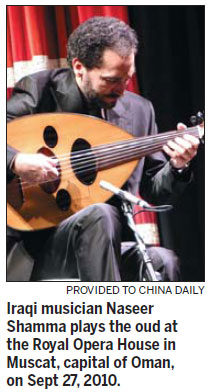Iraqi musician to return home
Updated: 2013-01-09 08:47
By Mynardo Macaraig in Manila (China Daily / Agencies)
|
|||||||||||
After years in exile, a master of an ancient instrument decides to bring his haunting music back to Baghdad
A former Iraqi soldier and prisoner who brought one of the world's oldest stringed instruments back into the spotlight is set to end his exile and take his haunting songs home.
Naseer Shamma is something of a global ambassador for the oud - a pear-shaped, six-stringed wooden instrument that hails from ancient Mesopotamia - but has avoided reaping the fruits of fame in his tumultuous homeland.
|
 |
Ten years since the fall of Saddam Hussein, however, Shamma has decided to return and end an exile borne out of oppression. "We need to help, to do something important for Iraqi people and Iraqi culture," the 49-year-old said during a visit to the Philippines for a concert.
Shamma first became entranced with the lutelike instrument when he was a child, later studying with oud master Munir Bashir and at the Baghdad Academy of Music in the late 1980s.
He went on to gain fame across the Arab world as both musician and composer, shocking purists by daring to go beyond tradition to make the instrument - the oldest recorded depiction of which is 5,000 years old - more contemporary, combining it with classical or jazz influences.
Ouds from Baghdad were once renowned for their quality and were exported all over the region, but war and unrest took their toll on the oud makers.
Conscripted into the army, Shamma served as a soldier during the first US-led war on Iraq in 1991, after the Iraqi invasion of Kuwait. "There was no real fighting. You just saw missiles coming in and you could not do anything. We never saw an enemy soldier," he recalled.
Shamma said he was also jailed for several months in 1993 over "politics", but declined to elaborate.
He left Iraq and moved to Tunisia for five years where he taught music, and then to Egypt, establishing the Arab Oud House to teach people how to play the "grandfather" of stringed instruments.
His expertise extended to following an ancient manuscript to build his own version of a 9th-century, eight-stringed oud. He also devised a one-handed method of playing the instrument, inspired by soldiers who lost limbs during the 1980-88 Iran-Iraq war.
Even after the fall of Saddam in 2003, the Iraqi musician refused to go home and did not return to his native land until last year when he performed three concerts.
"Life has changed completely - the people have changed too," he said. He feared cultural values were being eroded. He saw a new kind of people. "They have power, they have money, and life is confused," he said. "I felt that this is not my country, these are not my people."
The last US troops withdrew in December 2011. Though levels of violence are down from their 2005-2008 peak, attacks remain common.
But Shamma said he aimed to counter such extremism with culture and art, spurred on by the fact that the Arab League has designated Baghdad "Arab Capital of Culture" in 2013.
"There are thousands (of potential students) in Iraq. They contact me on the Internet. They ask me when I will be in Baghdad because they need to learn.
"At my last concert in Baghdad, I had a nice feeling with the audience," he said. "There are good moments coming."
Agence France-Presse
Related Stories
6 killed, 18 wounded in 2 car bombings in Iraq 2013-01-08 23:55
5 killed in violence in Iraq's Diyala 2013-01-06 00:58
Attacks in Iraq kill 22 amid anti-govt protests 2013-01-01 07:38
Iraqi deputy PM survives assassination bid 2012-12-31 04:34
End violence in Iraq 2012-12-19 11:20
UN slams deadly attacks in Iraq 2012-12-18 13:25
Today's Top News
President Xi confident in recovery from quake
H7N9 update: 104 cases, 21 deaths
Telecom workers restore links
Coal mine blast kills 18 in Jilin
Intl scholarship puts China on the map
More bird flu patients discharged
Gold loses sheen, but still a safe bet
US 'turns blind eye to human rights'
Hot Topics
Lunar probe , China growth forecasts, Emission rules get tougher, China seen through 'colored lens', International board,
Editor's Picks

|

|

|

|

|

|





